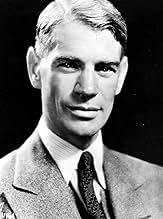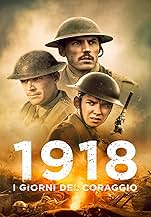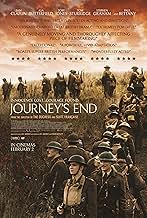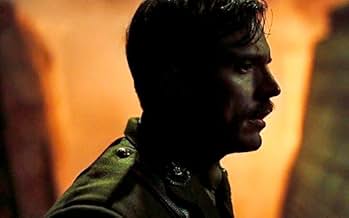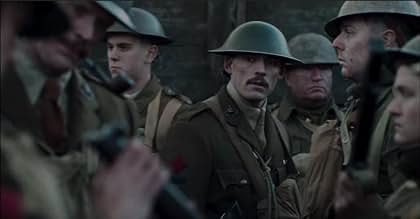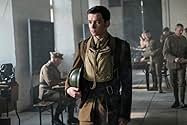IMDb-BEWERTUNG
6,7/10
11.963
IHRE BEWERTUNG
Es spielt in einem Unterstand in der Aisne im Jahr 1918 und erzählt die Geschichte einer Gruppe britischer Offiziere, angeführt von dem sich geistig auflösenden jungen Offizier Stanhope, die... Alles lesenEs spielt in einem Unterstand in der Aisne im Jahr 1918 und erzählt die Geschichte einer Gruppe britischer Offiziere, angeführt von dem sich geistig auflösenden jungen Offizier Stanhope, die auf ihr Schicksal warten.Es spielt in einem Unterstand in der Aisne im Jahr 1918 und erzählt die Geschichte einer Gruppe britischer Offiziere, angeführt von dem sich geistig auflösenden jungen Offizier Stanhope, die auf ihr Schicksal warten.
- Auszeichnungen
- 4 Gewinne & 3 Nominierungen insgesamt
Empfohlene Bewertungen
What a contrast to so much mediocrity and worse eg. Dunkirk. Set in the trenches in March 1918 but not really about the trenches or March 1918 at all.
Superbly cast and acted, a beautifully written reflection of a junior officer's view of the penultimate stages of WW1. Even more, this is a beautifully written reflection on the human spirit in adversity. Of course some of the senior officers are somewhat caricatured - that is what happens in real life. Of course it becomes more and more difficult with the passage of time for people to understand the mentality of empire, the public schoolboy ethos embodied by Raliegh, Maybe the same bravado and fear affects people joining violent gangs - I know not - but Raleigh is about the same age as some gang members - 18/19. Stanhope at 21/22 is a veteran of war, Uncle (Osborne - quite possibly early 30s) almost a veteran of life in their eyes.
Of course such characters have been used in films since - but this was written in 1928. It cut the new ground - others have followed.
The Roman Horace said "Dulce et decorum est pro patria mori." and it took until WW2 for Patton to say "The object of war is not to die for your country but to make the other bastard die for his." But what about sending your friends, your very best friends, your nearest and dearest to near certain death. What does that "do" to a man. Stanhope knows and through this film we can maybe glimpse that horror. What happens when there is no "cunning plan" left. Uncle knew.
Hold them off for as long as you can. In 1914, in 1918 when Journey's End is set, and again at Dunkirk ordinary men really did. No doubt there are countless other examples both before and in the last 70 years.
This film is a fitting tribute to those men.
Superbly cast and acted, a beautifully written reflection of a junior officer's view of the penultimate stages of WW1. Even more, this is a beautifully written reflection on the human spirit in adversity. Of course some of the senior officers are somewhat caricatured - that is what happens in real life. Of course it becomes more and more difficult with the passage of time for people to understand the mentality of empire, the public schoolboy ethos embodied by Raliegh, Maybe the same bravado and fear affects people joining violent gangs - I know not - but Raleigh is about the same age as some gang members - 18/19. Stanhope at 21/22 is a veteran of war, Uncle (Osborne - quite possibly early 30s) almost a veteran of life in their eyes.
Of course such characters have been used in films since - but this was written in 1928. It cut the new ground - others have followed.
The Roman Horace said "Dulce et decorum est pro patria mori." and it took until WW2 for Patton to say "The object of war is not to die for your country but to make the other bastard die for his." But what about sending your friends, your very best friends, your nearest and dearest to near certain death. What does that "do" to a man. Stanhope knows and through this film we can maybe glimpse that horror. What happens when there is no "cunning plan" left. Uncle knew.
Hold them off for as long as you can. In 1914, in 1918 when Journey's End is set, and again at Dunkirk ordinary men really did. No doubt there are countless other examples both before and in the last 70 years.
This film is a fitting tribute to those men.
This is definitely one of the best war movies I have ever seen.
No Rambo actions in this one. The title really depicts what the movies is all about A Journey's End. The brutality of war. Good men die like that . In times of war orders are orders. It is sad. I wonder all this potential gone to waste . Over 60 million people died in world wars. Countries destroyed. I wonder how the world would have been liked if only ...
I recommend you see this movie with high quality video . The sound is amazing& the cinematic . The acting is superb .
If you think that war is exciting . Think again . You ought to see it. Deserves a better rating.
Aisne 1918, Officer Stanhope is in charge of a group of men, who are in a bunker, awaiting a heavy German attack, only Stanhope's mental health is declining rapidly.
I've grown so accustomed to big budget war films, and there are many I have loved, Journey's End may not match them on special effects or extras or lavish battle scenes, but one thing it does have, is an incredible story.
The story of the mental decline of the leading man, Officer Stanhope, who's trying hard to keep it together in an impossible situation, alcoholism and paraboia. It's almost impossible to put yourself in place if one of those men, and imagine the torment, waiting to be attacked whist in a confined space.
A wonderful mix if characters, from the struggling Hibbert, to the avuncular Osborne, and of course the sarcastic Mason, all I kept thinking of was Baldrick from Blackadder 4, some wonderful, sharp one liners.
What a wonderful cast here, Paul Bettany, Stephen Graham, Toby Jones and many more, all spot on, very sincere performances, characters you can actually believe in.
It's subtle, no heavy accompanying music, no lavish special effects, it relies instead on the art of storytelling. They got the claustrophobia of the trenches spot on, as you watch you almost feel short of oxygen.
I thought this was quite an impressive film.
9/10.
I've grown so accustomed to big budget war films, and there are many I have loved, Journey's End may not match them on special effects or extras or lavish battle scenes, but one thing it does have, is an incredible story.
The story of the mental decline of the leading man, Officer Stanhope, who's trying hard to keep it together in an impossible situation, alcoholism and paraboia. It's almost impossible to put yourself in place if one of those men, and imagine the torment, waiting to be attacked whist in a confined space.
A wonderful mix if characters, from the struggling Hibbert, to the avuncular Osborne, and of course the sarcastic Mason, all I kept thinking of was Baldrick from Blackadder 4, some wonderful, sharp one liners.
What a wonderful cast here, Paul Bettany, Stephen Graham, Toby Jones and many more, all spot on, very sincere performances, characters you can actually believe in.
It's subtle, no heavy accompanying music, no lavish special effects, it relies instead on the art of storytelling. They got the claustrophobia of the trenches spot on, as you watch you almost feel short of oxygen.
I thought this was quite an impressive film.
9/10.
"Journey's End" takes place in the trenches of the Western Front in 1918. It was originally a very successful stage play in 1928 starring Lawrence Olivier in what must have been one of his first leading roles. In 1930 a film version was produced, one of the earliest British "talking pictures", directed by James Whale and starring Colin Clive (soon thereafter both were to re-team in the memorable films, "Frankenstein" and "Bride of Frankenstein).
The above is worth pointing out because the 1930 version which is still available for viewing on Youtube, makes an interesting comparison with this current production of the same story. That is because, meticulous as this production is, it was produced a century after the events depicted in the film. To the makers of this version, this material is ancient history. To the makers of the 1930 version, it was only a dozen years ago. Indeed, James Whale, who directed the 1930 film, actually had been a British officer on the Western Front during World War I. Consequently, to him, getting the details and the atmosphere right was not a matter of researching historical records, he had only to search his own memory.
Apart from the color photography and the differences in acting styles, one big difference is that the 1930 version had a lot more humor in. While the 2017 version seems unrelentingly grim, the characters in the 1930 version exhibit a lot more of the sort of dark humor that one might expect from troops in the front lines. It is almost as though that aspect of the play did not occur to the director, or else he had simply ignored it. Either that, or perhaps that sort of humor is now considered "politically incorrect".
Nevertheless, "Journey's End" is a highly evocative depiction of the Great War, and well worth seeing in this, the centennial of the end of "The War to End ALL Wars".
The above is worth pointing out because the 1930 version which is still available for viewing on Youtube, makes an interesting comparison with this current production of the same story. That is because, meticulous as this production is, it was produced a century after the events depicted in the film. To the makers of this version, this material is ancient history. To the makers of the 1930 version, it was only a dozen years ago. Indeed, James Whale, who directed the 1930 film, actually had been a British officer on the Western Front during World War I. Consequently, to him, getting the details and the atmosphere right was not a matter of researching historical records, he had only to search his own memory.
Apart from the color photography and the differences in acting styles, one big difference is that the 1930 version had a lot more humor in. While the 2017 version seems unrelentingly grim, the characters in the 1930 version exhibit a lot more of the sort of dark humor that one might expect from troops in the front lines. It is almost as though that aspect of the play did not occur to the director, or else he had simply ignored it. Either that, or perhaps that sort of humor is now considered "politically incorrect".
Nevertheless, "Journey's End" is a highly evocative depiction of the Great War, and well worth seeing in this, the centennial of the end of "The War to End ALL Wars".
I was fortunate enough to see the premiere of this film at the London Film Festival, and went in with no prior knowledge of the story or the characters, and was blown away by the impact this film has. Each actor suited their role perfectly, with Sam Claffin adding a smooth, sophisticated yet equally mysterious spin on the title character, Toby Jones adding fantastic one-liner humour to give the script more depth, and the other characters making the film's narrative put you on the edge of your seat. Usually I brush over war films, as I find the production and aesthetic quite similar. However, this film left me with lots of powerful thoughts and I am grateful to be one of the first to see it! Its now clear to see that this was based on a play, as the majority of the scenes were shot within the same set, with the focus on the characters' progression and the narrative as a whole, but this really worked! This is a film I highly recommend seeing- superb acting, released at a fitting time (its release being 100 years after the end of WW1), beautiful cinematography, a powerful script, and so much more! I will be seeing this again at the next given chance. So stop watching these big Hollywood remakes, be ready to be lost in the charm of this war film, and witness something quite special, that will hit you hard!- Sam Bishop
Wusstest du schon
- WissenswertesPlaywright R.C. Sherriff had seen first-hand the effect of years of war on his friends and knew the fear and terror of waiting for an impending attack, waiting for his journey's end. The characters in the play are a reflection of the men Sherriff had served with in the 9th Battalion of the East Surrey Regiment.
- PatzerA common misconception is the myth about having your chinstrap unbuckled. It is mainly an American thing that was spread in WW2. Fact is, if the concussion was strong enough to hurt your neck or face because your chinstrap was buckled, the force of the same concussion would more than likely kill you. Having your strap undone just meant you would spend a lot of time holding your helmet on while moving fast.
- Zitate
Lieutenant Osborne: Every little noise up there, makes me feel sick.
- VerbindungenFeatured in Projector: Journey's End (2018)
- SoundtracksElevation
Written and performed by Hildur Guðnadóttir
Top-Auswahl
Melde dich zum Bewerten an und greife auf die Watchlist für personalisierte Empfehlungen zu.
- How long is Journey's End?Powered by Alexa
Details
Box Office
- Bruttoertrag in den USA und Kanada
- 161.796 $
- Eröffnungswochenende in den USA und in Kanada
- 11.798 $
- 18. März 2018
- Weltweiter Bruttoertrag
- 970.809 $
- Laufzeit1 Stunde 47 Minuten
- Farbe
- Seitenverhältnis
- 1.85 : 1
Zu dieser Seite beitragen
Bearbeitung vorschlagen oder fehlenden Inhalt hinzufügen





